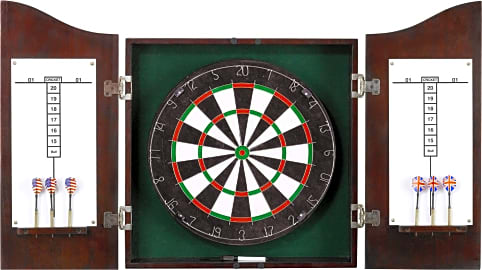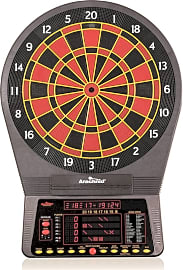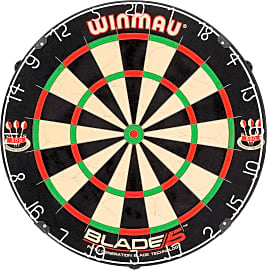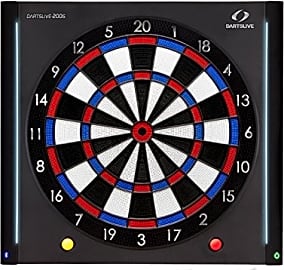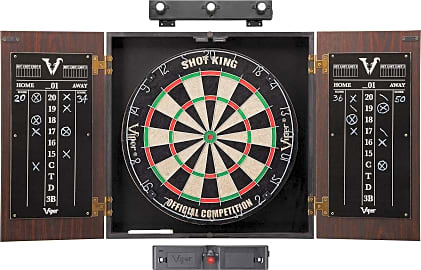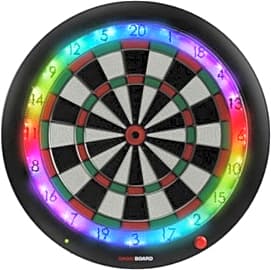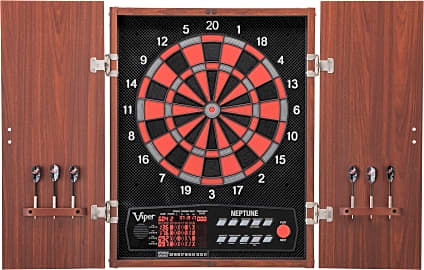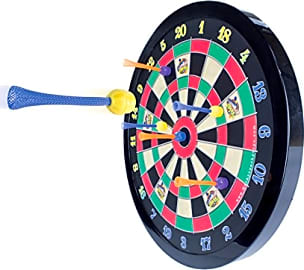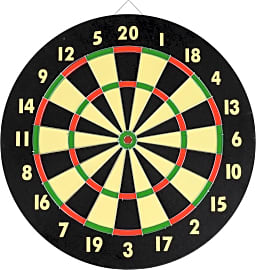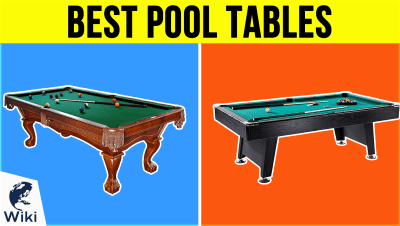The 10 Best Dart Boards

This wiki has been updated 40 times since it was first published in June of 2015. Is your game room missing something or do you have a blank space on the wall and bored kids running around causing trouble? One of these dartboards will take care of both of those problems in no time. We've included models with safe, non-sharp darts that are perfect for the younger members of your household along with tournament style boards that would not be out of place in a bar. When users buy our independently chosen editorial picks, we may earn commissions to help fund the Wiki.
Editor's Notes
May 11, 2021:
We're happy to report that all our selections remain available and highly recommended. The five varieties of the Barrington Collection Bristle Cabinet Set should look great in any billiards room or home bar and the Hathaway Centerpoint is a close second. If you're looking for a good electronic dartboard, both the Dartslive 200-S and Arachnid Cricket Pro 800 are great choices. For young kids, the especially safe Marky Sparky Doinkit Darts is worth a look, and if you need something that's functional and straightforward but neither fancy or expensive, the TG Champion 42-6006 is almost certainly the way to go.
February 10, 2020:
While some dart purists may feel that nothing compares to the classic, self-healing bristle board, others may enjoy the high-tech features that electric models can offer. We won't say one way or another which style we feel is better, but we did include both options on this list to ensure there are a few choices for every kind of player.
If you are looking for something classic, perhaps akin to what you would find hanging at your local bar across from that worn out pool table, then you will want to consider the Winmau Blade 5, which features a leveling system for mounting on uneven surfaces and has thin wires around the targets to improve scoring potential. Those who may prefer something slightly nicer, yet still classic, for their man cave may want to check out the Barrington Collection Bristle Cabinet Set, Viper Stadium Elite 40-1213, and Hathaway Centerpoint, all of which come with a cabinet to mount them in and scoreboards on the doors. Not only will these allow you to hide the board when not in use, but they also minimize the chances of winding up with a bunch of holes in your wall from errant darts.
Though they may not cultivate quite the same ambiance as their sisal bristle counterparts, electric models can offer a better, more versatile experience for some players. For example, the Dartslive 200-S and Gran Board 3 LED both connect to smart devices for game selection and scoring. They also allow you to pit yourself against a robotic or a remote human opponent, so even if you don't have a friend around to play with, you'll still get to enjoy the thrill of competition. Along with the previously two mentioned models, the Arachnid Cricket Pro 800 and Viper Neptune offer more than 35 games to choose from, sometimes with multiple variations of each. These latter two have the benefit of a built-in display too, so you won't need a phone or tablet to enjoy all of their features.
Special Honors
American Heritage Billiards Gateway Set into a handcrafted cabinet made of reclaimed wood and adorned with metal straps, the Gateway adds some rustic appeal to any space. The board itself is a tournament-quality unit made with self-healing bristles, and it comes with three weighted steel-tipped darts. americanheritagebilliards.com
Shelti Eye 2 Perfect for a bar or arcade, the Shelti Eye 2 is a coin-operated, floor-standing unit that can fold in half for transport when needed. It is compliant with the National Dart Association guidelines for handicapping, spot points, and spot marks; comes equipped with a large variety of games; and has a highly visible overhead score display. shelti.com
What Separates A Good Dart Board From A Great One?
If you're interested in efficiency, make it a point to seek out a set of steel-tipped darts that feature a riveted barrel and a plastic stabilizer for aerodynamic play.
Any regulation dartboard should be constructed out of sisal fibre, as opposed to cork. Sisal is a form of agave plant, which can be ground down and compacted to create a highly-resilient surface. Sisal responds better to perforation than cork, and as a result, any sisal board is less likely to reject a dart's steel tip.
Of course, there are any number of novelty darts on the market, but most of these darts look better than they perform. If you're interested in efficiency, make it a point to seek out a set of steel-tipped darts that feature a riveted barrel and a plastic stabilizer for aerodynamic play. Steel-tipped darts are the industry standard, and these darts are inexpensive in the event that they begin to dull.
A regulation dartboard measures 18 inches in diameter with a weight between nine and 12 pounds and a surface over one inch thick. Any standard board should feature 20 pie-shaped segments of equal size with a combination of colors, including black, white, red, and green. Certain boards feature a wire ring around the border with corresponding numbers soldered to it. This ring is meant to protect the numbers from becoming illegible as the board begins to wear.
Certain dartboards come housed inside a wooden cabinet. Wooden cabinets are beneficial in terms of keeping kids from playing with the darts. These cabinets are also capable of consolidating all of a dartboard's accessories in one place. You can also keep the dartboard closed off during certain formal events, thereby discouraging people from slinging sharp objects while others happen to be dining in the same room.
Darts 101: A Handful Of Games For Beginners
In a regulation game of darts, the board's bullseye should be positioned over five feet above the ground, and the throwing line should be located over seven feet from the board. Every player in a standard game of darts starts with a score of 501 (or 301), with the goal of reducing one's total score to zero. Players get to subtract points based on landing darts inside any of the numbered wedges around the board. If a player lands a dart inside the "20" wedge, for example, that player gets to subtract 20 points from his overall total. The outer ring of the bullseye counts for 25 points, while the inner ring counts for 50. Every player throws a total of three darts per turn.
The wide, black-and-white segments of any inning's wedge are worth one point; the thin, green-and-red segments of any inning's wedge are worth two points.
One popular variation on darts is a game known as Around The Clock, the objective of which is to land a dart in every numbered wedge around the board consecutively. A player cannot continue to the "2" wedge, for example, until he has landed a dart inside the "1" wedge first. Around The Clock ends when a player has made it around the board from one to 20. Otherwise, most standard rules apply.
Another popular variation on darts is a game known as Baseball. The goal for every "inning" of Baseball is to score as many points as possible by landing darts inside an appropriate wedge. During the first "inning," players take aim at the "1" wedge; during the second inning, the "2" wedge, and so on. The wide, black-and-white segments of any inning's wedge are worth one point; the thin, green-and-red segments of any inning's wedge are worth two points. A bullseye is worth three points during any inning, and the highest total at the end of all nine innings wins the game.
If you want to keep things simple, just draw a tic-tac-toe board on a piece of paper with a permanent black marker. Thumbtack the paper so that it sits level over the top of the dartboard. Now you're all set to play a game of Tic-Tac-Darts. Traditional Tic-Tac-Toe rules apply, except both players need to land a dart inside each square to own it, and they need to do the same in order to block.
A Brief History of The Dart Board
Up until the 19th century, darts were primarily associated with espionage and warfare. These weapons, which had been in existence in most countries since ancient times, could be designed out of anything from metal to bamboo. Darts could break the skin; they could be laced with toxins. Darts were still being used as a military weapon throughout the mid-1800s. According to legend, this is when the game of darts was born.
Darts were still being used as a military weapon throughout the mid-1800s.
British soldiers during the Crimean War are credited with inventing the idea of playing darts for recreation. Apparently, these soldiers would use a set of military darts along with the trunk of a tree (or a wine cask) to practice hitting a stationary target. Over time, this military pastime evolved to include rules, a point system, and a rudimentary board.
The standard number pattern for a dartboard was developed by a British carpenter named Brian Gamlin in 1896. Gamlin created his own board along with custom darts that were made out of wood. Gamlin placed turkey feathers along the back ends of his darts to make them more aerodynamic. He also added lead casing to provide more stabilization during flight.
Over the past 100 years, the game of darts has flourished. Night after night, the uninitiated continue to learn how to play darts inside taprooms the world over. The game is accessible to just about anyone, whether the overall goal happens to amateur bragging rights or professional prestige.


